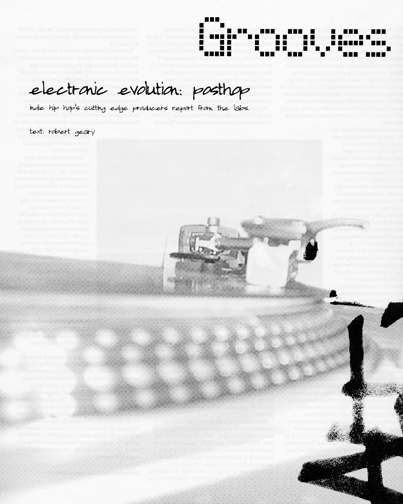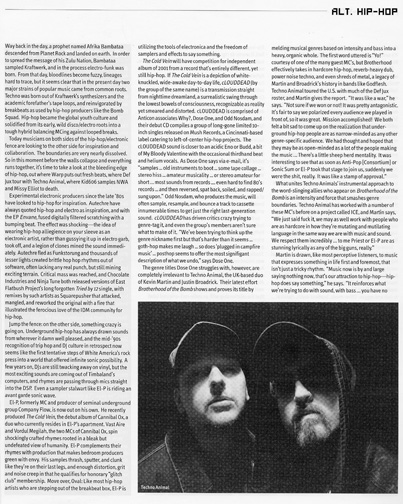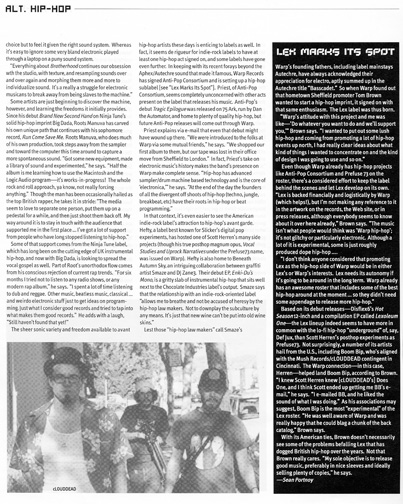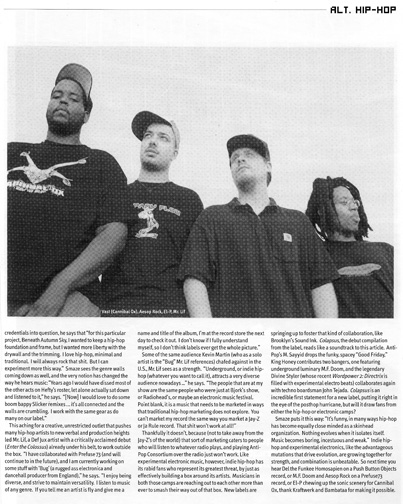
ELECTRONIC EVOLUTION: POSTHOP
INDIE HIPHOP'S CUTTING EDGE PRODUCERS REPORT FROM THE LABS.
Way back in the day, a prophet named Afrika Bambataa descended from the Planet rock and landed on earth. In order to spread the message of his Zulu Nation, Bambataa sampled Kraftwerk, and in the process electro-funk was born. From that day, bloodlines become fuzzy, lineages hard to trace, but it seems clear that in the present day two major strains of popular music came from common roots. Techno was born out of Kraftwerk's synthesizers and the academic forefather's tape loops, and reinvigorated by breakbeats as used by hip-hop producers like the Bomb Squad. Hip-hop became the global youth culture and solidified from its early, wild disco/electro roots into a tough hybrid balancing MCing against looped breaks.
Today musicians on both sides of the hip-hop/electronic fence are looking to the other side for inspiration and collaboration. The boundaries are very nearly dissolved. So in this moment before the walls collapse and everything runs together, it's time to take a look at the bleeding edge of hip-hop, out of where Warp puts out fresh beats, where Def Jux tour with techno Animal, where Kid606 samples NWA and Missy Elliot to death.
Experimental electronic producers since the late 80's have looked to hip-hop for inspiration. Autechre have always quoted hip-hop and electro as inspiration, and with the EP Envane, fused digitally filtered scratching with a bumping beat. The effect was shocking-the idea of wearing hip-hop allegiance on your sleeve as an electronic artist, rather than gussying it up in electro garb, took off, and a legion of clones mined the sound immediately. Autechre fled as Funkstorung and thousands of lesser lights created brittle hip- hop rhythms out of software, often lacking any real punch, but still mining exciting terrain. Critical mass was reached, and Chocolate Industries and Ninja tune both released versions of East Flatbush Project's long forgotten Tried by 12 single, with remixes by such artists as Squarepusher that attacked, mangled, and reworked the original with a fire that illustrated the ferocious love of the IDM community for hip-hop.
Jump the fence: on the other side, something crazy is going on. Underground hip-hop has always drawn sounds from wherever it damn well pleased, and the mid-'90s recognition of trip hop and DJ culture in retrospect now seems like the first tentative steps of White America's rock press into a world that offered infinite sonic possibility. A few years on, DJs are still twacking away on vinyl, but the most exciting sounds are coming out of Timbaland's computers, and rhymes are passing through mics straight into the DSP. Even the sampler stalwart like El-P is riding an avant garde sonic wave.
El-P, formerly MC and producer of seminal underground group Company Flow, is now out on his own. He recently produced The Cold Vein, the debut album of cannibal Ox, a duo who currently resides in El-P's apartment. Vast Aire and Vordul Megilah, the two MCs of Cannibal Ox, spin shockingly crafted rhymes rooted in bleak but undefeated view of humanity. El-P complements their rhymes with production that makes bedroom producers green with envy. His samples thrash, sputter, and clunk like they're on their last legs, and enough distortion, grit and noise creep in that he qualifies for honorary "glitch club" membership. Move over, Oval: Like most hip-hop artists who are stepping out of the breakbeat box, El-P is utilizing the tools of electronica and the freedom of samplers and effects to say something.
The Cold Vein will have competition for independent album of 2001 from a record that's entirely different, yet still hip-hop. If The Cold Vein is a depiction of white-knuckled, wide-awake day-to-day life, cLOUDDEAD (by the group of the same name) is a transmission straight from nighttime dreamland, a surrealistic swing through the lowest bowels of consciousness, recognizable as reality yet smeared and distorted. cLOUDDEAD is comprised of Anticon associates Why?, Doseone, and Odd Nosdam, and their debut CD compiles a group of long-gone limited 10-inch singles released on Mush Records, a Cincinnati-based label catering to left-of-center hip-hop projects. The cLOUDDEAD sound is closer to an acidic Eno or Budd, a bit of My Bloody valentine with the occasional thirdhand beat and helium vocals. As Doseone says via e-mail, it's "samples...old instruments to boot...some tape collage...stereo hiss...amateur musicality...or stereo amateur for short...most sounds from records...even hard to find 80's records...and then reversed, spat back, soiled, and rapped/sung upon." Odd Nosdam, who produces the music, will often sample, resample, and bounce a track to cassette innumerable times to get just the right last-generation sound. cLOUDDEAD has driven critics crazy trying to genre-tag it, and even the group's members aren't sure what to make of it. "We've been trying to think up the genre nickname first but that's harder than it seems...goth-hop makes me laugh...so does 'plugged in campfire music'...posthop seems to offer the most significant description of what we undo," says Doseone.
The genre titles Doseone struggles with, however, are completely irrelevant to Techno Animal, the UK based duo of Kevin Martin and Justin Broadrick. Their latest effort Brotherhood of the Bomb shows and proves its title by melding musical genres based on intensity and bass into a heavy. organic whole. The first word uttered is "Yo!" courtesy of one of the many guest MC's, but Brotherhood effectively takes in hardcore hip-hop, reverb-heavy dub, power noise techno, and even shreds of metal, a legacy of Martin and Broadrick's history in bands like Godflesh. Techno Animal toured the U.S. with much of the Def Jux roster, and Martin gives the report. "It was like a war," he says. "Not sure if we won or not! It was pretty antagonistic. It's fair to say we polarized every audience we played in front of, so it was great. Mission accomplished! We both felt a bit sad to come up with the realization that underground hip-hop are as narrow minded as any other genre-specific audience. We had thought and hoped that they may be as open-minded as a lot of the people making the music...There's a little sheep herd mentality. It was interesting to see that as soon as Anti-Pop [Consortium] or Sonic Sum or El-P took that stage to join us, suddenly we were the shit, really. It was like a stamp of approval."
What unites Techno Animals' instrumental approach to the word-slinging allies who appear on Brotherhood of the Bomb is an intensity and force that smashes genre boundaries. Techno Animal has worked with a number of these MC's before on a project called ICE, and Martin says, "We just said fuck it, we may as well work with people who are as hardcore in how their mutating and mutilating language in the same way we are with music and sound. We respect them incredibly...to me Priest or El-P are as stunning lyrically as any of the big guns, really."
Martin is drawn, like most perceptive listeners, to music that expresses something in life first and foremost, that isn't just a tricky rhythm. "Music now is by and large saying nothing now, that's our attraction to hip-hop-hip-hop does say something," he says. "It reinforces what we're trying to do with sound, with bass...you have no choice but to feel it given the right sound system. Whereas it's easy to ignore some very bland electronic played through a laptop on a puny sound system.
"Everything about Brotherhood continues our obsession with the studio, with texture, and resampling sounds over and over again and morphing them more and more to individualize sound. It's really a struggle for electronic musicians to break away from being slaves to the machine."



Some artists are just beginning to discover the machine, however, and learning the freedoms it initially provides. Since his debut Brand New Second Hand on Ninja Tune's solid hip-hop imprint Big dada, Roots Manuva, who does much of his own unique path that continues with his sophomore record, Run Come Save Me. Roots Manuva has carved his own unique production, took steps away from the sampler and toward the computer this time around to capture a more spontaneous sound. "Got some new equipment, made a library of sound and experimented," he says. "Half the album is me learning how to use the Macintosh and the Logic Audio program-it's works-in-progress! The whole rock and roll approach, ya know, not really forcing anything." Though the man has been occasionally hailed as the top British rapper, he takes it in stride: "The media seem to love to separate one person, put them up on a pedestal for a while, and then just shoot them back off. My way around it is to stay in touch with the audience that supported me in the first place...I've got a lot of support from people who have long since stopped listening to hip-hop."
Some of that support comes from the Ninja tune label, which has long been on the cutting edge of UK instrumental hip-hop, and now with Big Dada, is looking to spread the vocal gospel as well. Part of Root's unorthodox flow comes from his conscious rejection of current rap trends. "For six months I tried not to listen to any radio shows, or any modern rap album," he says. "I spent a lot of time listening to dub and reggae. Other music, beatless music, classical...and weirdo electronic stuff just to get ideas on programming. Just what I consider good records and tried to tap into what makes them good records." He adds with a laugh, "Still haven't found that yet!"
The sheer sonic variety and freedom available to avant hip-hop artists these days is enticing to labels as well. In fact, it seems de rigueur for indie-rock labels to have at least one hip-hop act signed on, and some labels have gone even further. In keeping with its recent forays beyond the Aphex/Autechre sound that made it famous, Warp Records has signed Anti-Pop Consortium and is setting up a hip-hop sublabel [see "Lex Marks Its Spot"]. Priest, of Anti-Pop Consortium, seems completely unconcerned with other acts present on the label that releases his music. Anti-Pop's debut Tragic Epilogue was released on 75 Ark, run by Dan the Automater, and home to plenty of quality hip-hop, but future Anti-Pop releases will come out through Warp.
Priest explains via e-mail that even the debut album might have wound up there. "We were introduced to the folks at Warp via some mutual friends," he says. "We shopped our first album to them, but our tape was lost in their office move from Sheffield to London." In fact, Priest's take on electronic music's history makes the band's presence on Warp make complete sense. "Hip-hop has advanced sampler/drum machine based technology and is the core of electronica,"' he says. "At the end of the day the founders of all the divergent off shoots of hip-hop (techno, jungle, breakbeat, etc) have their roots in hip-hop or beat programming."
In that context, it's even easier to see the American indie-rock label's attraction to hip-hop's avant garde. Hefty, a label best known for Slicker's digital pop experiments, has hosted one of Scott Herren's many side projects (through his true posthop magnum opus, Vocal Studies and Uprock Narrativfes under the Prefuse73 name, was issued on Warp). Hefty is also home to Beneath Autumn Sky, an intriguing collaboration between graffiti artist Smaze and Dj Zane3. Their debut EP, Enki-Du's Mono, is a gritty slab of instrumental hip-hop that sits well next to the Chocolate Industries label's output. Smaze says that the relationship with an indie-rock-oriented label "allows me to breathe and not be accused of heresy by the hip-hop law makers. Not to downplay the subculture by any means. It's just that new wine can't be put into old wine skins."
Lest those "hip-hop law makers" call Smaze's credentials into question, he says that "for this particular project, Beneath Autumn Sky, I wanted to keep a hip-hop foundation and frame, but I wanted more liberty with the drywall and the trimming. I love hip-hop, minimal and traditional. I will always rock on that shit. But I can experiment more this way." Smaze sees the genre walls coming down as well, and the very notion has changed the way he hears music: "Years ago I would have dissed most of the other acts on Hefty's roster, let alone actually sat down and listened to it," he says. "[Now] I would love to do some boom bappy slicker remixes...it's all connected and the walls are crumbling. I work with the same gear as do many on our label."
This aching for a creative, unrestricted outlet that pushes many hip-hop artists to new verbal and production heights led Mr. Lif, a Def Jux artist with a critically acclaimed debut (Enter the Colossus) already under his belt, to work outside the box. "I have collaborated with Prefuse73 (and will continue to in the future), and I am currently working on some stuff with 'Bug' (a rugged as electronica and dancehall producer from England)," he says. "I enjoy being diverse, and strive to maintain versatility. I listen to music of any genre. If you tell me an artist is fly and give me a name and title of the album. I'm at the record store the next day to check it out. I don't know if I fully understand myself, so I don't think labels ever get the whole picture."
Some of the same audience Kevin Martin (who as a solo artist is the "Bug" Mr. Lif references) chafed against in the U.S.,Mr. Lif sees as a strength. "Underground, or indie hip-hop (whatever you want to call it), attracts a very diverse audience nowadays..." he says. "The people that are at my shows are the same people who were just at Bjork's show, or Radiohead's, or maybe an electronic music festival. Point blank, it is a music that needs to be marketed in ways that traditional hip-hop marketing does not explore. You can't market my record the same way you market a Jay-Z or Ja Rule record. That shit won't work at all!"
Thankfully it doesn't, because (not to take away from the Jay-Z's of the world) that sort of marketing caters to people who will listen to whatever radio plays, and playing Anti-Pop consortium over the radio just won't work. Like experimental electronic music, however, indie hip-hop has its rabid fans who represent its greatest threat, by just as effectively building a box around its artists. Musicians in both those camps are reaching out to each other more than ever to smash their way out of that box. New labels are springing up to foster that kind of collaboration, like Brooklyn's Sound Ink. Colapsus, the debut compilation from that label, reads like a soundtrack to this article. Anti-Pop's M. Sayyid drops the funky, spacey "Good Friday," King Honey contributes two bangers, one featuring underground luminary M.F. Doom, and the legendary Divine Styler (whose recent Wordpower 2: Directrix is filled with experimental electro beats) collaborates again with techno boardsman John Tejada. Colapsus is an incredible first statement for a new label, putting it right in the eye of the posthop hurricane, but will it draw fans from either the hip-hop or electronic camps?
Smaze puts it this way: "It's funny, in many ways hip-hop has become equally close minded as a skinhead organization. Nothing evolves when it isolates itself. Music becomes boring, incestuous and weak." Indie hip-hop and experimental electronics, like the advantageous mutations that drive evolution, are growing together for strength, and combination is unbeatable. So next time you hear Del the Funkee Homosapien on a Push button Objects record, or M.F. Doom and Aesop Rock on a Prefuse73 record, or El-P chewing up the sonic scenery for Cannibal Ox, thank Kraftwek and Bambataa for making it possible.
ROBERT GEARY